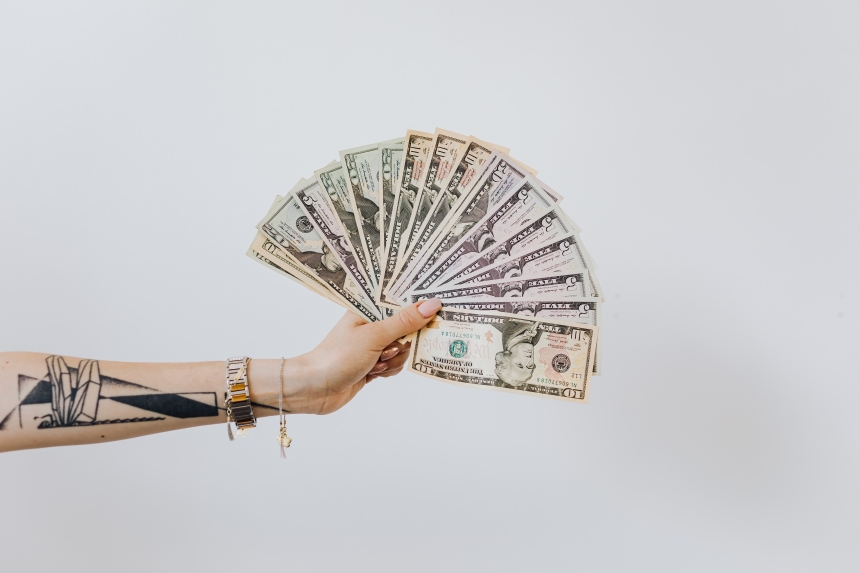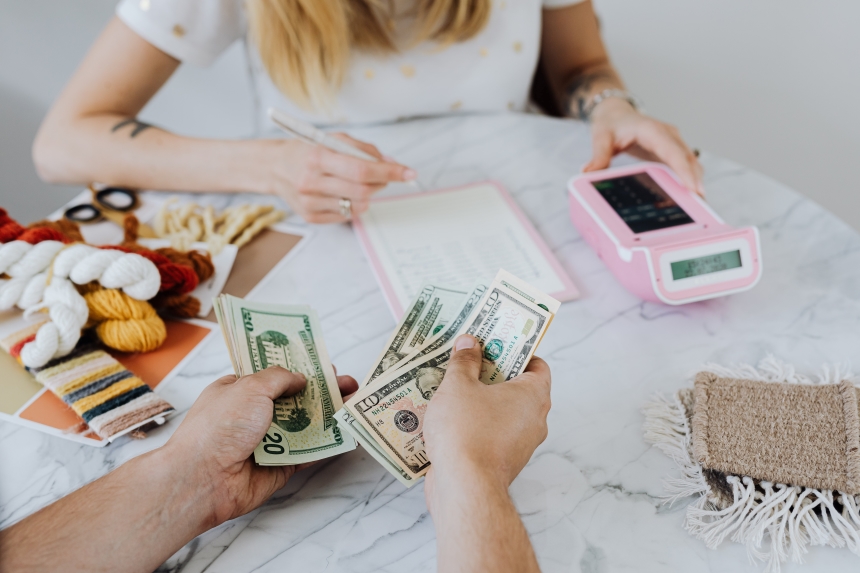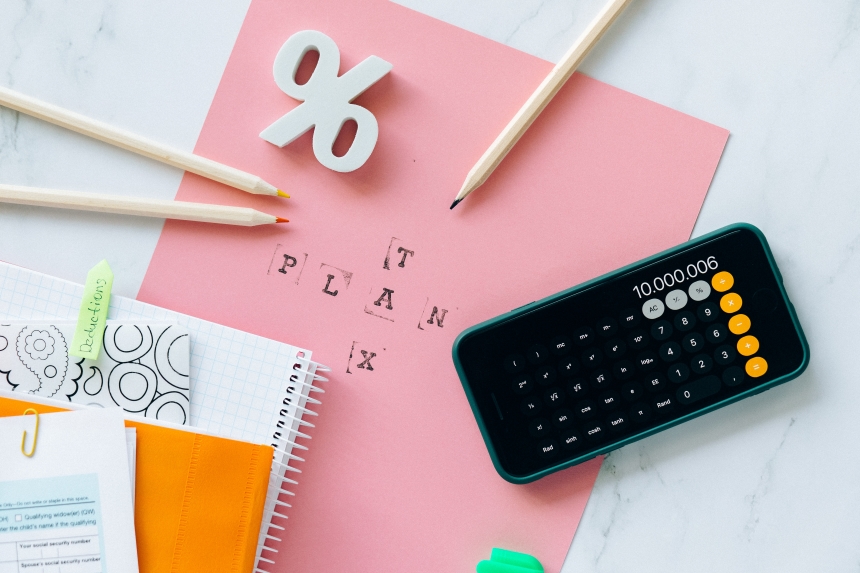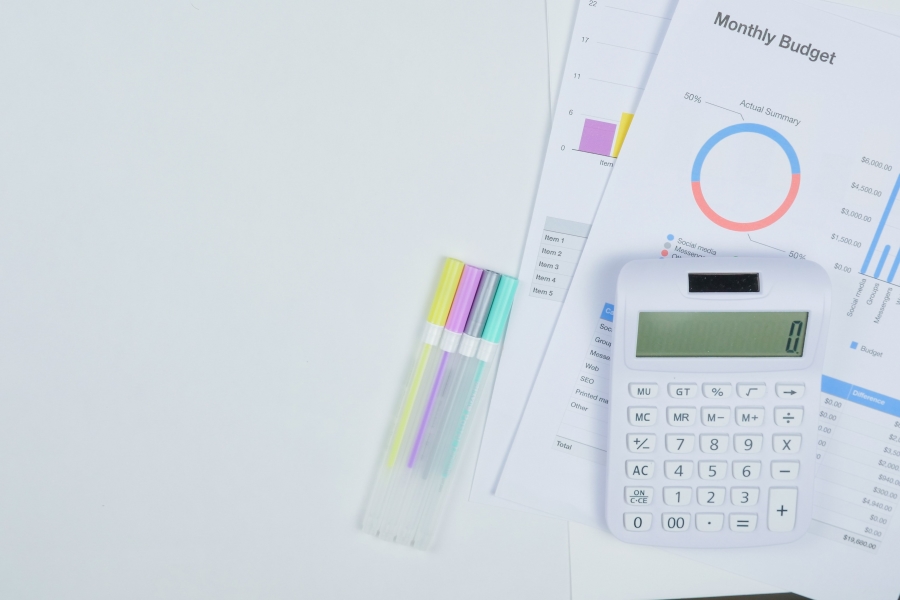Good money habits you should adapt if you’re trying to save more money
This blog post talks about good spending habits you can adopt to save more money in the long run.
It’s a painful truth that we’re emotionally and psychologically linked to money-related habits.
However, many people are unaware that how they spend or save money has a direct impact on their stress levels and mental well-being.
Stress and anxiety can be significantly reduced if your spending is under control.
Without further ado, let’s talk about which saving habits you could adopt.

NB! This is not financial advice! This is just me talking about tips that have helped me in the long run. I’m just sharing my experience. Make sure to talk to a professional before you make any rash decisions.
This post may contain affiliate links. That means that if you click on a link and purchase something I recommend, I will receive a small commission at no extra cost to you.
Here’s a list of my favorite good financial habits
1. Unsubscribe from promotional newsletters
Or the majority of them. Marketing experts know exactly which buttons, text, and flashing images will tempt you to buy.
If you’re unable to avoid making an unnecessary purchase when you see the special offer, click “unsubscribe” for all of the offers you don’t need.
2. Ask for a discount from telecommunications companies
Ask a few friends if they have a much cheaper and more affordable phone or internet package.
Call your network company and ask about the terms under which you might be able to get a better deal. If this isn’t possible, switch providers.
3. Sell things you don’t need
Do you have any dresses in your closet that you haven’t worn in a long time? What about all those accessories in the shoebox under the bed that you no longer need? Clothes that are too small for you?
Sell them cheaply in Facebook groups or at recycling centers.
4. Go through your subscriptions
Netflix, Spotify, and Hulu! Think about your habits: when was the last time you opened each of them, and how much money would you save if you didn’t use them?
Find at least one you don’t use and cancel it. This is one of my favorite good spending habits, for sure.
5. Drive safely in traffic and keep track of parking information
Proper traffic behavior isn’t only a safer way to participate in traffic, but it’s also a more sustainable way to participate in traffic. The fines aren’t pleasant. They’re not cheap.
However, getting a parking ticket because you forgot to put a parking meter on your dashboard is particularly absurd.
6. Make good use of any extra money you have
Did you receive a raise at work? Did you receive a scholarship for your academic performance? In any case, make good use of the extra cash you’ve been given.
And no, that doesn’t mean going shopping during the discount campaign and celebrating with champagne at the city’s busiest restaurant.
7. Make an initial purchase and price calculation for the more expensive purchase
Don’t buy more expensive items just because you see them in the store. Compare product prices and offers across different stores and websites.
Sometimes you can find the same item for tens of dollars less somewhere else.
8. Get rid of bad habits
Add up how much you’ve spent on cigarettes, chocolate bars for emotional purchases, and chips eaten in front of the TV. Bad habits are only beneficial if they’re broken.
9. Examine the product’s shelf life
Follow the shelf life dates on products in the store and, if possible, choose the furthest date; this way, you can consume the product for longer.
Tip: If you know you’ll be using the product soon, look for same-day discounts.
10. Larger purchases: after-payment vs. a small loan?
Make an informed decision! If you plan to buy a more expensive product using after-pay, be sure to read about the terms and costs. Make sure to look into a variety of options.
11. Go to recycling centers
In second-hand stores, you can sometimes find decent and unique clothing and other things for essentially nothing.
Tip: There are several second-hand stores where all products are $1–5 on certain days. If you want to have better, healthier money habits, I suggest you try this one.
12. Do it yourself!
If you need a cake for a birthday, don’t order one; instead, make one yourself! YouTube is full of videos that show you how to do almost anything quickly and easily.
Tip: If you need a jigsaw or a sewing machine, ask your friends if they can lend you one; don’t buy it right away!

13. Plan trips with neighbors or friends
Perhaps you work in a similar area as your neighbor? Or do your children engage in the same activity? You can sometimes cut your fuel costs in half by carpooling with friends.
14. Try not to buy seasonal items during the season
Do you need new winter clothing? If possible, buy them in the spring, when clothing stores want to get rid of their winter coats and ski pants quickly and at a low price.
It’s well known that the day after Christmas is the best time to buy Christmas decorations. Or you can get school supplies cheaper on the first day of school.
15. Be aware of family and friends in need
Help them to the best of your ability. You never know when you will need help. The help and advice of loved ones can be extremely beneficial in overcoming difficulties.
16. Take care of your home appliances and vehicles
Continuous maintenance of your car and important household appliances, as well as ongoing repair of minor problems, helps prevent unexpected and very critical problems that already necessitate higher costs.
17. Visit the dentist
Don’t let your dental health deteriorate to the point where you need several hundred dollars for dental care. Continue to monitor and maintain the health of your teeth (and other parts of your body).
18. Insure your valuables and compare insurance rates
Examine your insurance providers and keep an eye out for campaigns that offer bargains, such as 12 months of insurance for 10 months.
Make sure your most valuable assets—your home, car, and health—are properly insured. I know a lot of people have life insurance as well.
19. Make a backup plan in case your income drops
Even if your income hasn’t yet decreased, schedule a family meeting to discuss crisis scenarios in case your family’s financial situation deteriorates.
This is one of those good habits to save money that’s also preventive.
It should start by mapping and analyzing family income and expenses. The emphasis should then be on distinguishing between needs and wants, avoiding all unnecessary costs, and redirecting the money into a savings account.
Ideally, your savings buffer should be large enough to cover your family’s 3-6 month expenses, but even a small financial buffer can provide some peace of mind in the event of an unexpected event.
20. Read money-saving tips and join communities
It’s true that the more you delve into a topic and conduct research on it, the clearer, simpler, and more personal it’ll become for you. Investigate the various money-saving communities on social media and online resources.
21. Ask for discounts
It may sound scary, but whenever you make a large purchase, always ask if you can get a discount. Sometimes all you need to do is talk to a seller who is in a good mood and will give you a good price.
22. Make homemade gifts for your friends as a surprise
Autumn preserves, homemade snacks, knitted scarves, gloves, or poems written by yourself are all warm-hearted gifts.
When planning for Christmas, consider what gifts you can make yourself by investing your time and soul in them instead of money.
23. Invite friends to come over
Simply put, a bottle of wine costs the same as a glass of wine outside, and you can take a large cake home for the price of a small piece of cake in a café.
Instead of going out, arrange to meet people at home every now and then.
24. Plan ahead of time
Theater tickets, cinema discount days, early-bird festival passes, airline tickets, and spas—it’s one of my favorite good spending habits because, if you plan ahead, you can have a truly good cultural experience or even a trip for half the price!

25. Base your family’s spending on actual financial opportunities
Do it rather than thinking about your neighbor’s choices or what’s advertised. In other words, don’t try to live above your means and avoid unnecessary debts and payments.
26. Don’t go shopping until your refrigerator is completely empty
An empty refrigerator isn’t necessarily a bad sign. Consider it a sign that you can plan your meals and consume food wisely.
Before going to the store, make sure the fridge and cupboards are empty. This will save you from having to throw away a lot of products.
27. Only go to the store after you’ve eaten
As the saying goes, an empty stomach makes the best cook. And a terrible companion when you’re shopping for food.
28. Deposit funds into an account without using credit cards
A good tip is to pay yourself first on payday before paying your bills by transferring the money to another account in a so-called “emergency fund” or “savings.”
This way, the extra cash is out of sight while your sense of security grows.
29. Take public transportation
It’s favorable and convenient, and it’s actually your time to think, read, or listen to something interesting. This is one of those good money-saving habits that’s also good for your mind.
30. Invest in order to grow your savings
Your savings are significant, but they become even more significant as they increase in value over time. Learn about investment opportunities and how to multiply your savings over time.
31. Keep track of your electricity usage
Small changes lead to big changes, so use LED bulbs at home, don’t leave lights on when you leave the room, and turn off, for example, the bathroom floor heating when you’re gone for an extended period of time.
32. Don’t buy something just because it’s cheap
During promotional campaigns, it’s important to consider what you want and what you actually need.
Don’t buy a dress on sale for 30% off only to find it with a price tag somewhere in the back of your closet a year later. Say “no” to impulse buys!
33. Find out about available side jobs
Earning more money is just as important as saving more money. Casual jobs are a good option if you have a permanent job, but there are occasionally available time slots in your schedule.
34. Visit the library
Put yourself in line for a new, long-awaited book at the library; if you like the book, you can always buy it later.
35. Paid training vs. free YouTube training
Today, you can find a lot of training courses on the Internet for quite a good price. However, such courses with similar information are completely free on YouTube.
36. Avoid making emotional purchases
If you see a fierce jacket in the store or have been wanting an espresso machine for a long time because your neighbor has one, give yourself 24 hours to consider whether you should buy it right away.
You might be surprised at how many things you don’t really need and later wonder why you bought them in the first place.

37. Set yourself motivational goals
All goals are conducive to working towards them, whether it’s the goal of eating junk food only once a month or the goal of collecting a 3-month salary buffer during X time.
38. Don’t dismiss additional sources of income
Use and expand your skills and knowledge. Despite the fact that a lot of people are dissatisfied with their income, only a very small number can say they are involved in entrepreneurship.
39. Create a personal budget for yourself
Budgeting is the best! It’s one of the best money habits because writing down costs allows you to gain an understanding of how much you’re constantly spending on different product groups (food, bills, clothes, etc.).
Create a monthly or weekly budget for each product group based on the information received; try to stick to it, and you will notice how the costs are under control.
Here’s the only budget planner that you need to achieve all your financial goals.
40. Keep an eye out for store specials
What makes you buy the same sweater, headphones, or cleaner at full price if it is 30 percent or even 50 percent cheaper on a discounted day?
41. Make a weekly menu
It’s among those good spending habits because, this way, your shopping is more purposeful, quick, and easy, and you can anticipate how much the week’s meals will cost.
Here’s a meal planner that will save you so much time (and money!).
42. Purchase food from online stores
All major grocery stores now have an e-commerce option. It’s easier to keep track of the shopping list and avoid emotional purchases. You’ll also save time by shopping online.
43. Borrow from a friend
Could a friend or neighbor lend you the cordless drill you’ll need to install the new shelf? It’s not always reasonable (or necessary) to buy a new item for a single use.
44. Purchase a piggy bank or a coin jar
Buy a piggy bank to which you can add cents from your pocket. You might be surprised at how quickly the jar fills up and how much it can eventually hold.
Here’s the most adorable piggy bank that will motivate you to put more money aside.
45. Bring coffee in a thermos
3-5 dollars for coffee may not seem like a big deal at first, but many coffees a month add up to a lot of money. Here’s an affordable thermos for your hot beverages.
46. Make a distinction between necessary and emotional purchases
Otherwise, you’ll end up spending far more money than you intended.
Making a shopping list, setting a spending limit before going to the store, or even leaving your credit card at home when you go to the store will all help you with this.
47. Take your grocery bag and shopping list to the store
Do you have the habit of buying things you don’t need and forgetting why you went to the store in the first place? Put a post-it note on your fridge with a shopping list for the entire family that you can take with you.
48. Separate your expenses into cost groups
It’s among the really good saving habits because it’s a visual representation that shows how, at the end of the month, all those cocktails and five pairs of new shoes justify themselves.
To be honest, you’ll probably find a lot of interesting items that you wouldn’t have noticed otherwise and that you should keep an eye on in the future.

49. Understand the cost of owning a car
Consider your moves and whether the two cars in your family are justified.
Add up the costs of insurance, gas, maintenance, tire changes, leasing, and so on, and consider whether a car is necessary or whether one car will suffice for a family.
50. No-purchase days
Set a goal for yourself (or the entire family) to buy nothing one day per week. It can be a lot of fun!
51. Take your lunch to work
In fact, it’s nice to have leftover dinner in the office kitchen the next afternoon while reading a good book or watching your favorite show.
Besides, you know exactly what you’re eating! Here’s a nice, affordable, leak-proof lunch box.
52. Bring a bottle of water with you
You can take a unique bottle of water with you and refill it at free drinking water stations, just like you can with coffee. It quenches your thirst just as well! Here’s a nice, BPA-free motivational water bottle.
53. Examine your training routines
Perhaps you have a gym nearby with a better deal, or maybe one-time tickets are more reasonable? Or maybe you should start working out at home after all?
54. Be cautious when using various online services (including e-shops)
Check the online store’s history to ensure its legitimacy. It’s important to first determine who the seller is and whether or not they are actually selling the goods. We don’t like scammers, do we?
55. Go for a walk
This is one of those good money-saving habits because a quick walk can sometimes replace your workout or a taxi ride, and it can also substitute for rush hour in a car.
Put on some headphones, listen to some nice music or podcasts that you enjoy, and make use of these walks in the fresh air.
Before you leave, make sure to check out my blog post about useless things I stopped buying to save more money.
Don’t forget to pin!


FAQ: How do I create good spending habits?
The world is living in uncertain times. What happens elsewhere affects us in a variety of ways. So, while we hope for the best, we must be prepared for the unexpected.
You need regular savings to be prepared for the unexpected.
It’s generally recommended that you save 5–10% of your monthly income. The money saved helps with unexpected unemployment, long-term illnesses, and reduced wages.
So, let’s talk about the three things that financially independent people do. It’s really important to know how to be better with money.
Financially intelligent people don’t spend all of their earnings
Most people who make a lot of money spend a lot of it on their lives. They will save whatever is left.
Regrettably, only a small amount remains, or they’ve spent everything. That’s not a good way to manage personal finances.
Successful people, on the other hand, make sure that when they receive money, they first set aside the portion that they need to meet their goals. You can do the same.
For example, you could set aside a portion of your paycheck. You can also set up an automatic system in which some of the money is transferred directly to your savings account.
Financially intelligent people take advantage of good opportunities
Wealthy people will never stop looking for high-paying jobs. They’re always looking for new ways to improve themselves and their finances.
Their financial goals include getting a promotion, finding passive income, or starting a business.
However, by increasing their incomes, they won’t start spending more money; their standard of living will remain stable, and they’ll continue saving money.
Also, they’re more likely to put some of their money into the financial markets.
They’re aware that there are dangers. At the same time, they recognize that regular, long-term investment is an excellent way to grow their assets over time.
Financially intelligent people don’t make financial decisions based on emotions
Financially successful people make decisions that support their long-term goals and strategies rather than buying or selling based on their feelings and emotions.
They understand the importance of good spending habits.
They believe in developing a thorough plan and intend to stick to it. They don’t wear the latest trends or listen to popular advice.
It’s understandable that putting aside money-related emotions isn’t always easy, but it’s something that can be practiced.
It’s also important to develop systems that help you avoid making irrational decisions.
For example, before making a major decision, you could think and consider it for 24 hours or even 7 days.




